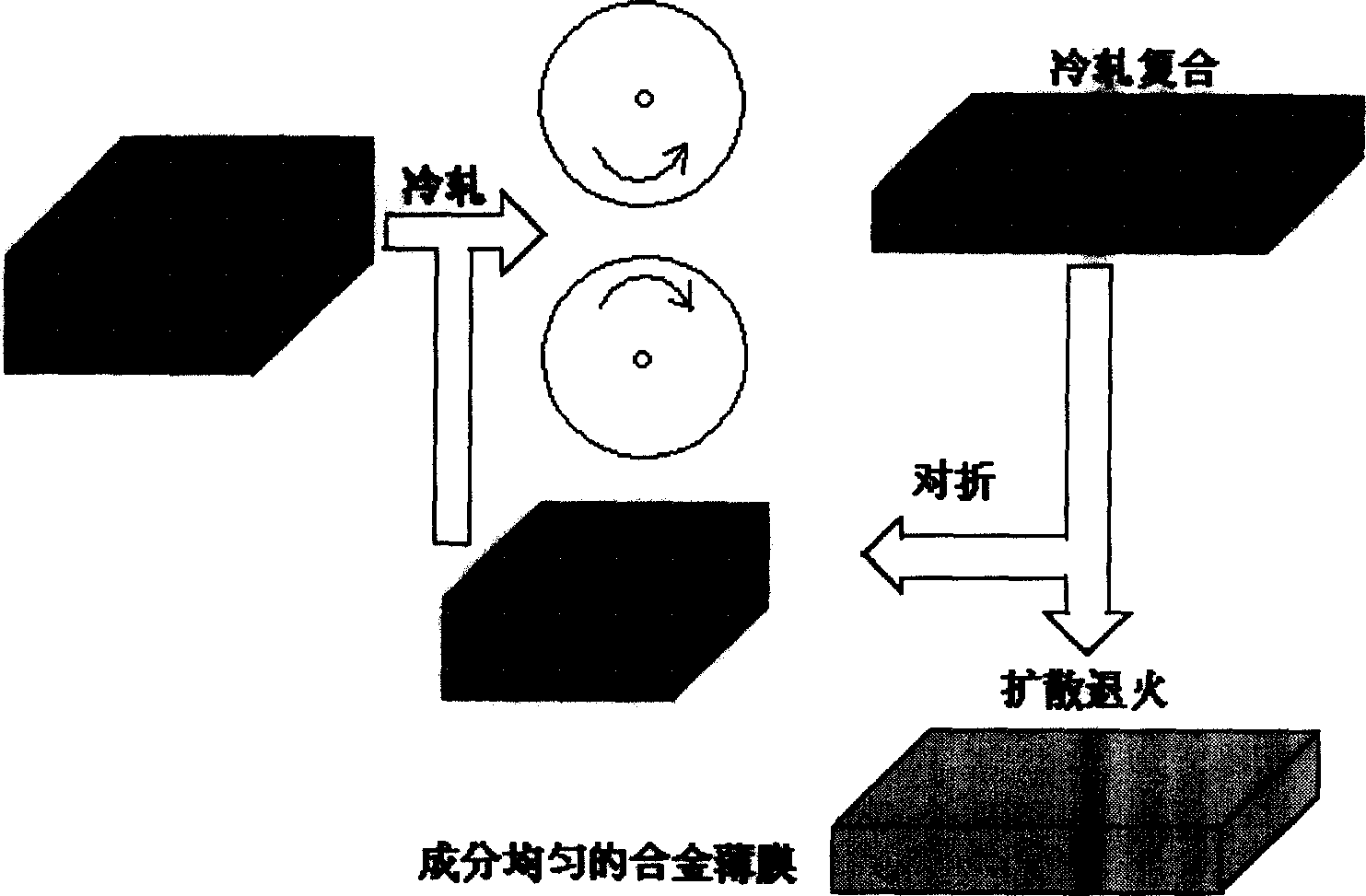Production of CuALNiMn shape memory alloy thin membrane by cold rolling superthin laminated alloy
A memory alloy and alloying technology, applied in the field of shape memory alloy, can solve the problems of film width limitation and unsuitability for industrial production, etc., and achieve the effects of low-cost performance, good cold deformation ability, and high fatigue life
- Summary
- Abstract
- Description
- Claims
- Application Information
AI Technical Summary
Problems solved by technology
Method used
Image
Examples
Embodiment 1
[0016] According to the designed composition formula (percentage by weight): Al 14.5%, Ni 5%, and the balance is copper. Al foil with a thickness of 0.100 mm and Cu-5.85Ni (weight percent) alloy foil with a thickness of 0.178 mm are used as raw materials, and 10 layers are stacked alternately. First cold rolling to 1.000mm with a deformation of 64%, and then cold rolling to 0.060mm, the cold rolled film is folded and overlapped, and then cold rolled to 0.060mm, repeating 10 passes. Finally, the cold-rolled 10-pass film was kept at 873K for 40 hours for diffusion alloying. The alloyed film was reheated to 973K, kept warm for 0.5 hours and water quenched. The Ms point of the alloy was determined to be 141K by the resistance method, and it was bent by 6% at the temperature of liquid nitrogen, and the shape was completely restored after heating.
Embodiment 2
[0018] According to the designed composition formula (percentage by weight): Al 13%, Ni 4%, and the balance is copper. Al foil with a thickness of 0.100 mm and Cu-4.65Ni (weight percent) alloy foil with a thickness of 0.200 mm are used as raw materials, and 10 layers are stacked alternately. First cold rolled to 1.000mm with a deformation of 67%, and then cold rolled to 0.080mm. Fold the cold-rolled film in half, and then cold-roll to 0.080mm, repeating this 10 times. Finally, the cold-rolled 10-pass film was kept at 900K for 30 hours for diffusion alloying. The alloyed film was reheated to 1073K, kept warm for 0.3 hours and water-quenched. The Ms point of the alloy was determined to be 406K by the resistance method. It was bent by 6% at room temperature, and the shape was completely restored after heating.
Embodiment 3
[0020] According to the designed composition formula (percentage by weight): Al 12%, Ni 5%, Mn 2%, and the balance is copper. Al foil with a thickness of 0.100 mm and Cu-5.58Ni-2.27Mn (weight percent) alloy foil with a thickness of 0.220 mm are used as raw materials, and 10 layers are stacked alternately. First cold rolled to 1.600mm with a deformation of 50%, and then cold rolled to 0.100mm. Fold the cold-rolled film in half, and then cold-roll to 0.100mm, repeating this 10 times. Finally, the thin film cold-rolled for 10 passes was kept at 923K for 20 hours for diffusion alloying. The alloyed film was heated to 1173K, kept warm for 0.25 hours and water-quenched. The Ms point of the alloy was determined to be 434K by the resistance method. It was bent by 6% at room temperature, and the shape was completely recovered after heating.
PUM
| Property | Measurement | Unit |
|---|---|---|
| thickness | aaaaa | aaaaa |
Abstract
Description
Claims
Application Information
 Login to View More
Login to View More - R&D
- Intellectual Property
- Life Sciences
- Materials
- Tech Scout
- Unparalleled Data Quality
- Higher Quality Content
- 60% Fewer Hallucinations
Browse by: Latest US Patents, China's latest patents, Technical Efficacy Thesaurus, Application Domain, Technology Topic, Popular Technical Reports.
© 2025 PatSnap. All rights reserved.Legal|Privacy policy|Modern Slavery Act Transparency Statement|Sitemap|About US| Contact US: help@patsnap.com

